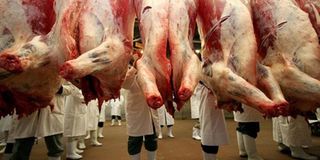UNBS stamps don’t ensure meat is safe

Slaughtered animals in a Kampala abattoir. File photo
Uganda National Bureau of Standards (UNBS) has signed a memorandum of understanding with Kampala Butchers and Traders association (KABUTA) to improve the quality of meat products and ensure compliance to food safety standards.
Ideally this should be great news to the public who continue to be fed on bad meat sold at decrepit meat shops.
Yet UNBS vision of quality meat seems to be focused on token processes of stamping meat with their quality certification d quality mark and less on what in fact makes the meat sold dangerous to the public.
Beyond stamping on the meat (usually one or two stamps that will be invisible after a few chops), UNBS needs to address itself to where the meat is actually sold and how it is transported.
Nearly all the meat shops in this country have no cold storage facility and meat is displayed in open windows where it attracts flies and all manner of insects.
This means that even after it has been stamped with the UNBS quality mark at the point of slaughter, there is no guarantee that it is fit for consumption one hour after it has been taken to a meat shop in the suburbs.
UNBS might, therefore, do well to pick something from the remarks of KABUTA chairperson, who emphasised that quality assurance must be at all stages of the chain – from slaughter to transportation to storage to the nature of the meat shop.
Transporting meat on boda boda motorcycles in dirty polythene bags should not be allowed as should displaying meat in open windows without ventilation mesh or glass to keep away dust and flies.
UNBS and other related agencies should also consider ending the transportation of live animals from different places in a very tortuous manner to slaughter houses in Kampala and instead promote the slaughter of the animals at source so the meet is ferried in refrigerated trucks to city meat shops.
Yes, many will argue that there are no such trucks in the country or there are very few, but that is because it is not mandatory to use them.
When the Ministry of Agriculture and Animal Resources a few years ago made a decision to stop the transportation of milk in plastic containers and other contraptions, hell broke loose, but in the end, there was compliance.
Today there are hundreds of custom-made milt trucks with coolers transporting milk over long distances.
UNBS and other concerned agencies, therefore, just need to start, then it will happen.




